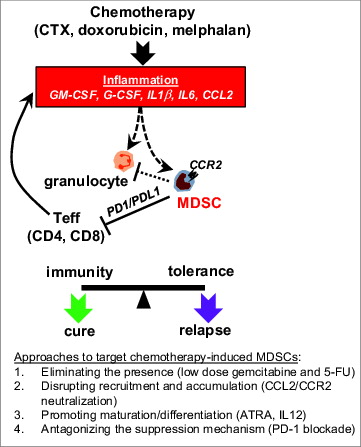Figures & data
Figure 1. Chemotherapy-induced MDSCs represent a critical obstacle to successful chemo-immunotherapy. Some standard-of-care chemotherapeutic agents, exemplified by cyclophosphamide (CTX), doxorubicin and melphalan, can induce the expansion of myeloid-derived suppressor cells (MDSCs), possibly through the action of inflammatory mediators including GM-CSF, G-CSF, IL1β, IL6 and CCL2. These therapy-induced MDSCs are highly proliferative and express high levels of CCR2. Effector T cells (particularly Th1-type CD4+ effector cells) can amplify chemotherapy-induced MDSCs, likely by intensifying the inflammatory milieu. These chemotherapy-induced MDSCs suppress T-cell activation in a PD-1-dependent manner. Chemotherapy also leads to expansion of granulocytes, which contribute to tumor rejection. Chemotherapy-induced MDSCs may suppress the antitumor activity of granulocytes. Targeting therapy-induced MDSCs can thus prevent immune tolerance and tip the balance toward durable antitumor immunity. Approaches that can potentially target chemotherapy-induced MDSCs are listed. Dotted lines indicate hypotheses yet to be tested.

